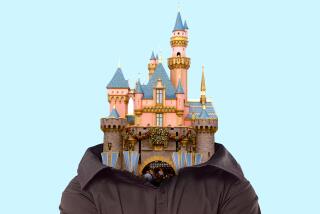Slot Machine Designers Use Controversial Spin
- Share via
LAS VEGAS — Holding his mother’s hand, 3-year-old Christian Schilling wanders through the crowded Sunset Station casino, his head turning to take in all the seductive low-lit allure of this decidedly adult domain.
Then he stops cold, transfixed by the oversized slot machine before him, as though he were gawking at the irresistible antics of some Saturday morning TV kids show.
“Hello! Hello! Hello!” chime the unmistakable voices of Moe, Larry and Curly, part of the colorful computerized come-on for the new Three Stooges slot machine being test-marketed at the casino in suburban Henderson.
Young Christian smiles. But it’s Curly’s puckish “Nyuk, nyuk, nyuk” that finally does it, enticing the toddler to walk toward the machine, his tiny hand extended.
“Look at him,” said his mother, Flora Schilling. “He already wants to play. He’s saying ‘Mom, hurry up. Gimme a quarter!’ ”
Concerned about the appeal of such gambling devices to children, Nevada Gaming Control Board officials are eyeing the machines warily. Its five-member commission is considering new regulations that would ban all cartoon characters, comic strip superheroes, kiddie board games and other child-friendly themes from state slot machines.
Under Nevada law, new slots such as the Three Stooges model must be tested and approved by the state gaming board before being permanently introduced to the casino floor.
Themed slot machines aren’t new. Prompted by the success of the “Wheel of Fortune” slot introduced five years ago, casinos across Nevada now feature slots based on hip-swiveler Elvis Presley, cutesy 1920s cartoon icon Betty Boop and such board games as Monopoly and Yahtzee.
Along with the Stooges slot, newer machines under study feature likenesses of the Pink Panther, Lurch and Uncle Fester from the “Addams Family” and Monte Hall from the game show “Let’s Make a Deal.” There’s even an “I Dream of Jeannie” slot, in which Barbara Eden’s voice consoles losers with a cooing “I’m sorry, Master.”
These machines are being eyed for state approval because--while still considered child-friendly--the board found they also have sufficient interest for adults.
Gaming officials point to at least three new machines they have initially denied licenses for because they employ blatant child-friendly cartoon imagery.
One is based on the controversial cable television cartoon show “South Park” and another on a Saturday morning superhero who board members describe as “a step above the Teletubbies.”
The third was a machine called “Easy Street,” based on the children’s board game “Candyland.”
“Now, who on earth could that slot machine be directed toward?” asked gaming control board chairman Steve DuCharme. “If you look on the Candyland game itself, it clearly says it’s intended for children between the ages of 3 and 6 years old.”
DuCharme says that manufacturers can appeal by resubmitting their license applications to the board.
Recently, the state gaming commission sponsored a hearing attended by the dozen slot-makers that dominate the $5-billion-a-year industry in which members decried the “mad rush to lock up licensing agreements with icons familiar to children.”
They say they want to develop regulations so manufacturers didn’t dump millions into developing a new game, securing rights to a well-known icon, only to have the game’s license denied.
The themed-slot trend began in the mid-’90s with the success of “Wheel of Fortune,” which calls out to gamblers with a signature audience shout now so wearily familiar to casino regulars it’s known as the “Wheel of Torture.”
Still, the game immediately tripled the average slot machine’s $100-a-day take and stood out among other slots with such innocuous names as “Filthy Rich” and “Reel ‘em In.”
After that, the race for recognizable icons was on.
DuCharme says the industry may be opening itself up to “Joe Camel” criticism, echoing shots cigarette-makers took by using a cartoon icon popular with young adults to market their cigarettes. The minimum age for gambling in Nevada is 21.
“Why direct slots to kids if they can’t even play them?” he asked of slot machine makers. “There are many more appropriate images available.”
Joe Lahti, president of Shuffle Master, maker of the Three Stooges slot, insisted that the game is by no means directed at children.
“There is absolutely zero intent on the part of manufacturers to draw children into gambling,” he said. “To connect Joe Camel with a slot machine is unfair.”
Lahti and others say the Camel ads were posted in public, where anyone--including children--could see them. Casinos, on the other hand, are controlled environments where children are not allowed to gamble.
“We understand the board’s concern,” Lahti said, “and if it’s proven that our games draw kids, then we’ll rectify the situation.”
Critics of the new games say manufacturers and casino operators know exactly what they’re doing, placing the kid-friendly games along the routes to children’s areas of hotel-casinos.
DuCharme says he is also concerned that child-friendly games could find their way to convenience stores and other outlets in a state where gambling machines are ubiquitous.
“Our concern is over young kids standing around in a 7-Eleven or waiting for their parents in some casino--are they going to be captivated by these new graphics and enticed to violate the law?”
Pumping quarters into the Three Stooges slot machine at Sunset Station casino, retiree Velma Sparks said the game’s instant recognition with kids concerns her.
“When I saw this game, I said to myself ‘Oh no! They couldn’t have!’ ” she said of the slot, situated next to the Monopoly and Betty Boop machines. “Not an image of my childhood. That’s sacred.”
She points to a huge Stooges marquee with a picture showing Moe using pliers to pull Curly’s teeth, an image accompanied by the come-on: “Get your gold here.” And another showing Moe slapping Larry with the words: “More fun than a slap on the face!”
“Imagine what these images would do to a young mind?” said Sparks. “It’s a lure.”
Added gambler Dave Woolfall: “This is sinful. Look at the kids walking through this casino. They view these slots as video games. Are manufacturers trying to run an introductory school for young gamblers? They should be ashamed.”
Nearby, Lucille Polons of Wilkes-Barre Pa., disagreed, saying the gambling industry is already over-regulated. Children, she said, don’t belong in casinos anyway.
“Adults should judge their own actions, and as a parent, I wouldn’t bring my kid into a place like this,” said the grandmother of four. “If one even suggested they wanted to play a slot, I’d grab them by the scruff of the neck and say ‘C’mon, we’re going.’ ”
Watching young Christian in action, Flora Schilling already knows the allure such television images have over her impressionable son.
“It’s seductive. He sees the same images he sees on TV and immediately he feels right at home,” she said. “These manufacturers aren’t dumb. I’m sure a lot of market research goes into these machines to attract kids just like my son.”
More to Read
Sign up for Essential California
The most important California stories and recommendations in your inbox every morning.
You may occasionally receive promotional content from the Los Angeles Times.














